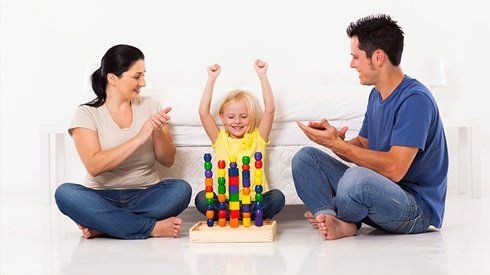Praising Children | Trinityhouse Pre-Primary Schools
The question we ask on this subject should not be, should we praise young children but how should we praise young children?
When our babies begin to demonstrate skills such as sitting, crawling, walking and feeding themselves, we show huge excitement and pleasure and encourage them to repeat the skill for daddy, auntie etc. We say things like, ‘Good boy!’ As they grow and begin to learn shape sorting, turning the pages of a book, helping with the dusting, we continue the praise by saying things like, “What a clever boy you are for finding the circles”. ”You are such a clever girl to ride your trike like that”. Thus begins the habit of praising the child for being clever, pretty, strong, etc. and this can be detrimental because we need to praise a child for effort, perseverance and grit, not for natural endowments.
As the child enters Play School/Pre-Primary
parents will be greeted at the end of the school day with a selection of sticky boxes, brown paintings and half chewed baking. (If you are presented with coloured-in pictures or worksheets, you have chosen the wrong school!) Back to the messy art-work; your response here should be something like the following:
• ‘Gosh, I can see you worked hard on this picture, can you tell me about it?’
• ‘I see that the colours all turned brown, what colours did you start with? What do you think happened with the colours?’
• ‘That biscuit looks interesting, tell me how you made it?’
• ‘You even have sand in your hair; you must have dug really deep in the sandpit.”
A response that does not encourage thought or future effort, and one that may make your child mistrust your judgement, would be, “That’s lovely darling.” It can easily discourage the child from future effort if they feel they may not be able to reach this standard again, or worse, they know you are lying.
We can also create praise junkies if we are too liberal in the praise given. The child just seeks praise for the slightest thing and thus effort decreases. I have seen this in a Grade 0 class when a child seeks teacher’s approval for every small thing they do.
In everything your child achieves or needs recognition for, try and focus on the effort, perseverance or the learning that has taken place and be realistic but kind. From an early age children need to understand that effort, perseverance and courage in the face of difficulty are praiseworthy. Praising natural ability and intelligence does not raise a child’s self-esteem. Praise must reflect real achievement and be authentic.
When it comes to behaviour, praise what you want to be repeated. “I really liked the way you sat still through our meal. Thank you”. “I was so proud of the way you thanked Auntie Betty for having you for tea. I could see that she really liked your good manners.”
As well as learning to praise your child, knowing how to correct is just as important. Modern life seems to focus so much on success at everything, that failure and mistakes are considered to be disasters. Not getting something right the first time is an ideal opportunity to teach children to reflect on the reasons it did not work and to plan how they will do it differently next time. Stories of overnight success are seldom true and even young children need to learn the value of trying again and planning differently.
A reflective comment from a parent such as, “I’m sorry your science project did not work when you worked so hard on it, how do you think you could build it differently next time? If a child struggles constantly at any activity, the activity needs to be moderated so that success is possible. Small steps in achievement and growth should be the aim.
Naturally bright children do not necessarily achieve the best in schools. Those who have had authentic and honest praise, who understand that achievement needs motivation and determination, will go far, even if they do not find learning easy. Achievement is a marathon, not a sprint. This mind-set can begin from toddlerhood.
Grit is a term seldom used in these days of helicoptering parents. Grit is one of the abilities we have, based on cognitive control, and this can be taught. Children need to understand how their brains work and with technology we have, they can be shown how brains react to different stimuli and how working hard and persevering will develop their brains. As they get older they need to know that the ability to learn is not fixed and can be constantly developed through perseverance and practice. ‘I can get better when I try harder’. ‘My intelligence grows with effort’. Teach children to approach life and work with a growth mind-set rather than simply praising whatever they do.
So what is the goal when it comes to encouraging children? Keep in mind your long-term goals for them and watch for the effects of what you say. Ultimately, you want to encourage your children to be self-motivated and to embrace challenge, and that means not making them dependent on praise. When they reach the world of varsity and work, there will be no one praising their every move and if they have become used to this from home, life will be tough.















